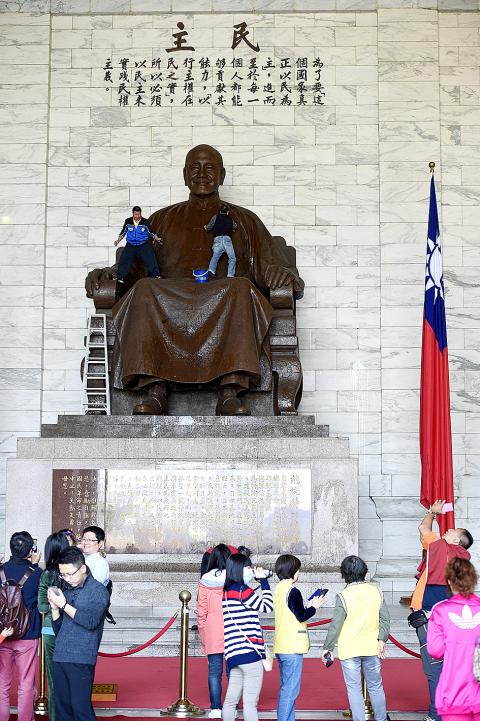Dealing with the National Chiang Kai-shek Memorial Hall tops the Transitional Justice Commission's to-do list, commission member Yang Tsui (楊翠) said yesterday.
Removing the hall’s statue of Chiang Kai-shek (蔣介石) has been prioritized as the first step toward enacting the commission’s mandate stipulated in the Act on Promoting Transitional Justice (促進轉型正義條例) to “remove all symbols of authoritarianism and preserve the sites of injustice,” Yang said in an exclusive interview with the Liberty Times (sister newspaper of the Taipei Times), adding that discussions with the Ministry of Culture regarding the move are under way.
“The commission is mulling three options for the change: relocating the statue, designating the hall as a ‘negative heritage site’ or destroying the statue altogether,” Yang said.

Photo: George Tsorng, Taipei Times
However, destroying the statue would create the risk that younger generations would not recognize Chiang, let alone see him as the authoritarian figure that he is, she added.
The commission is also mulling changes to the physical layout of the hall to portray a different look from the past authoritarian regime, especially in terms of historical memory, Yang said.
It would become a public space, where any visitor would immediately learn the historical truth about incidents in Taiwan and understand that Chiang was a dictator who presided over atrocities, Yang said.
They would be made to understand how the authoritarian regime operated and would be presented with memories, Yang said.
“The goal of the changes is to elucidate how Chiang should be remembered,” Yang said, adding that regardless of which solution is adopted, Chiang would not continue to be worshiped.
“The statue, enshrined within the hall and treated like a god, will either be moved or undergo changes that would remove it as an icon of authoritarian worship,” Yang said, adding that the changes would not be for tourism or commercial purposes.
Yang, a Taiwanese literature academic, is one of the commission’s three full-time members.
The act, passed in December last year, stipulates the creation of a nine-member committee of the Executive Yuan entrusted with making political archives more readily accessible, including the retrieval of those kept by the Chinese Nationalist Party (KMT); removing remnants of authoritarian rule; redressing miscarriages of justice; producing a historical report on the period; and promoting transitional justice.
The Democratic Progressive Party-controlled Legislative Yuan on May 8 approved all nine commission members nominated by Premier William Lai (賴清德), while the KMT and People First Party caucuses abstained.

A magnitude 7.0 earthquake struck off Yilan at 11:05pm yesterday, the Central Weather Administration (CWA) said. The epicenter was located at sea, about 32.3km east of Yilan County Hall, at a depth of 72.8km, CWA data showed There were no immediate reports of damage. The intensity of the quake, which gauges the actual effect of a seismic event, measured 4 in Yilan County area on Taiwan’s seven-tier intensity scale, the data showed. It measured 4 in other parts of eastern, northern and central Taiwan as well as Tainan, and 3 in Kaohsiung and Pingtung County, and 2 in Lienchiang and Penghu counties and 1

FOREIGN INTERFERENCE: Beijing would likely intensify public opinion warfare in next year’s local elections to prevent Lai from getting re-elected, the ‘Yomiuri Shimbun’ said Internal documents from a Chinese artificial intelligence (AI) company indicated that China has been using the technology to intervene in foreign elections, including propaganda targeting Taiwan’s local elections next year and presidential elections in 2028, a Japanese newspaper reported yesterday. The Institute of National Security of Vanderbilt University obtained nearly 400 pages of documents from GoLaxy, a company with ties to the Chinese government, and found evidence that it had apparently deployed sophisticated, AI-driven propaganda campaigns in Hong Kong and Taiwan to shape public opinion, the Yomiuri Shimbun reported. GoLaxy provides insights, situation analysis and public opinion-shaping technology by conducting network surveillance

Taiwan is gearing up to celebrate the New Year at events across the country, headlined by the annual countdown and Taipei 101 fireworks display at midnight. Many of the events are to be livesteamed online. See below for lineups and links: Taipei Taipei’s New Year’s Party 2026 is to begin at 7pm and run until 1am, with the theme “Sailing to the Future.” South Korean girl group KARA is headlining the concert at Taipei City Hall Plaza, with additional performances by Amber An (安心亞), Nick Chou (周湯豪), hip-hop trio Nine One One (玖壹壹), Bii (畢書盡), girl group Genblue (幻藍小熊) and more. The festivities are to

AFTERMATH: The Taipei City Government said it received 39 minor incident reports including gas leaks, water leaks and outages, and a damaged traffic signal A magnitude 7.0 earthquake struck off Taiwan’s northeastern coast late on Saturday, producing only two major aftershocks as of yesterday noon, the Central Weather Administration (CWA) said. The limited aftershocks contrast with last year’s major earthquake in Hualien County, as Saturday’s earthquake occurred at a greater depth in a subduction zone. Saturday’s earthquake struck at 11:05pm, with its hypocenter about 32.3km east of Yilan County Hall, at a depth of 72.8km. Shaking was felt in 17 administrative regions north of Tainan and in eastern Taiwan, reaching intensity level 4 on Taiwan’s seven-tier seismic scale, the CWA said. In Hualien, the